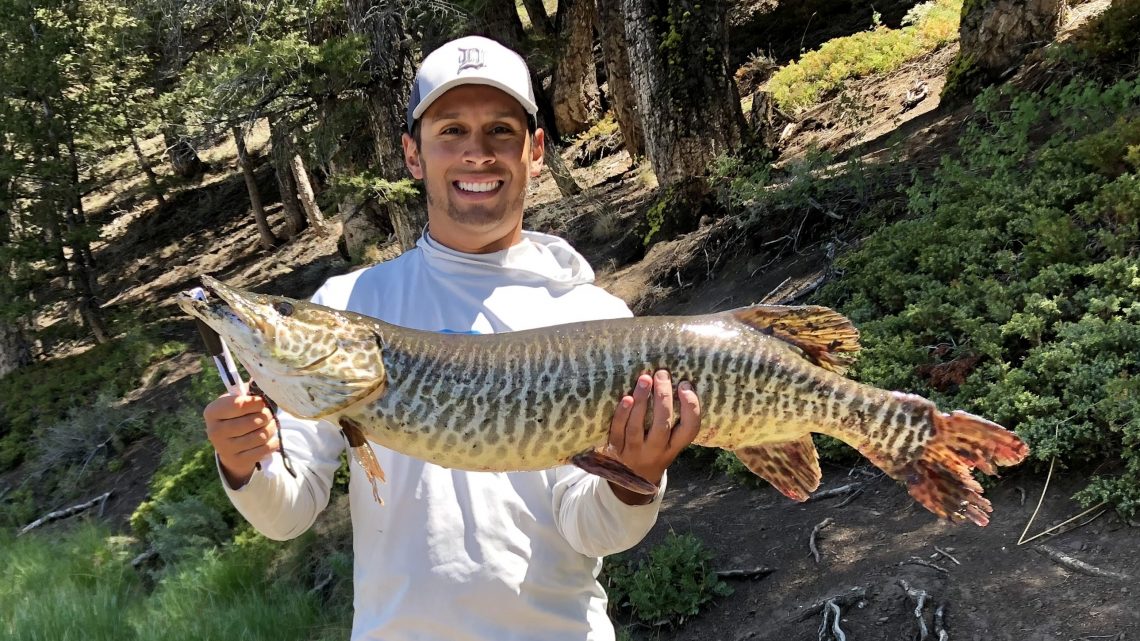
The tiger muskie was positioned on a perfect ambush point. Most of its body was obscured by weeds, but I could detect the faint movement of fins and a few telltale stripes. I cast my swimbait so tight to the vegetation that the tail hook snagged a reed. “Let it ride,” I thought. “I can probably pull it out of there and right into his strike zone.”
A twitch. The lure shook free and got his attention. Another twitch. He closed in. A third twitch, followed by the longest two seconds of my life. HE ATE IT!! FISH ON!!!
Let me back up. Catching a muskie has been a goal ever since my buddy Caleb got one on our maiden voyage to Little Payette Lake. Helping land that fish was a thrill, but I wanted one of my own.
Unfortunately, subsequent trips have yet to produce a muskie—only smallmouth bass and pikeminnow have taken our oversized lures. So, this summer, Caleb and I decided to take our muskie hunt to the next level. Only about 30 fisheries in the state hold tiger muskie, and roughly half of those are mountain lakes, where tigers are stocked by Fish & Game to control brook trout populations. After tons of background research, we trekked into the backcountry to fish one such hidden gem.
Muskie fishing is best done from a boat. Shoreline access is often limited in good muskie habitat, and it would be a fiasco trying to land one from a float tube (my usual go-to for alpine lakes). With no way to get a boat to our destination, we took small kayaks instead.
We arrived late-afternoon, set up camp and were on the water by 5 p.m. Within seconds of launching my kayak, I saw a big muskie swim by. They were here! But could we get one to bite?
It was clear this kayak experience would be tougher than our recent Lake Walcott trip. We rolled in style that day, catching giant smallmouths out of souped-up Hobies provided by kayak champion Kyle Zemke.
These kayaks were much smaller and wobblier. Caleb, a roofer by trade, was able to balance on his. He had several muskie follow his lure and hooked one that escaped. I had a hard time standing on my boat and mostly fished wading in waist-high water. I landed a few nice brook trout on flies and spinners, but ended the evening without any muskie action.
That night around the campfire, Caleb described watching muskies react to his lure. The high vantage point was critical, it seemed—tomorrow, I would stand.
We were up before the sun and paddling across the glass-calm lake. Within minutes, I had my first muskie follow. Then another. They didn’t bite, but seeing the action gave me hope.
Staying atop that squirrely kayak was a battle. I even took a chilly, accidental swim, but I climbed back on and kept fishing. Several more muskies followed. None committed. When I needed a mental break, I fished for brookies and enjoyed the scenery. Then, back to the grind.
I spotted my muskie hiding in the reeds at about 1 p.m.—well outside “peak” hours, according to lunar charts and other literature.
Funny thing about muskies—they don’t read much. As my lure broke free from the reeds, the fish darted in and snapped it up. As I set the hook, he rocketed out of the water in one of the most jaw-dropping leaps I’ve ever seen.
“I’m coming!” Caleb hollered from across the lake.
I hung on for dear life, winching the large, violent fish off the bottom of the lake. Somehow, I stayed on my feet as I fought the thrashing muskie with my left arm and unfolded a huge landing net with my right. On my first net attempt, the fish jumped again, landing just inches from my kayak. The next time I got him to the surface, I slid the net under him—just in time for Caleb to help tow me and a very angry muskie to shore.
Finally on solid ground, we celebrated. A victory whoop echoed off the mountainside as we snapped photos and measured 38 inches of muskie. As I held it by the tail and watched it swim off, I thought of all the hours I had spent researching and chasing this elusive predator; of the effort it took to make this wilderness excursion; and the frustration of multiple, last-second muskie rejections. Victory was sweet.
Forty minutes later, Caleb caught a 39-inch muskie and the whole scene repeated. We put a lot of work into catching those mountain tigers—their reputation as the fish of 10,000 casts is well-earned—but the magic that unfolded in one adrenaline-pumping afternoon made it all worth it. Tight lines!